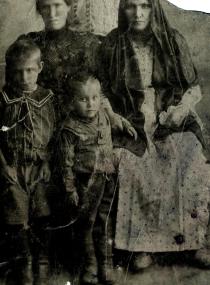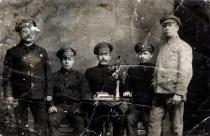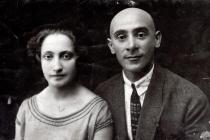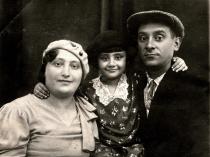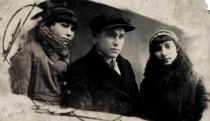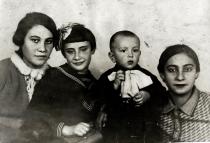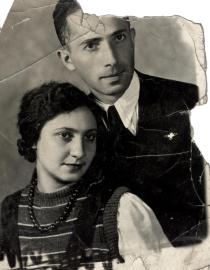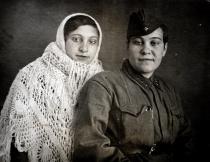
Elizaveta Dubinskya
Interviewer: Zhanna Litinskya
Date of interview: November 2001
Yelizaveta Dubinskaya is a very ill woman. When we came over, she met us sitting against the pillows. She lives in a very small two-room flat with her daughter. Both of them are on pension and receive aid from the Jewish community and “Khesed”. During the interview she had to lie down and rest quite often. Despite all of this, she is very kind and sometimes witty.
My name is Yelizaveta Dubinskaya. I was born with this last name; this is my father’s last name.
I was born in Kiev, or to be more precise, Kiev’s suburb, Slobodka, on the Pushkinskaya Street. I was born on May 12, 1922.
I knew none of my grandparents: they died before I was born.
The name of my grandfather – my father’s father – was Yankel Dubinsky; my grandmother’s name was Leah. I don’t remember her maiden name. I don’t remember when they were born. Grandmother Leah was born in Boguslav, but I don’t know where my grandfather was born. My grandfather was some kind of a craftsman, and grandmother Leah worked around the house. My grandfather left for America (prior to the Revolution), but failed to get rich and died there. So, my grandmother remained a widow. She earned her living by cooking for people. People would come and eat at her place, and they paid a little for that. She was a very good cook, my father always praised her roast meat; my mother could never please him with her own cooking, she could never cook quite as tasty as his mother.
The names of my mother’s parents were: father – Yosef Reznik, mother – Yenta. I don’t know her maiden name. My grandfather was born in the town of Shenderovka, Kiev province. He went to kheder and received craftsman education. My grandmother worked around the house, while my grandfather was a tailor. They were religious, prayed to God and attended the synagogue. But I did not know them, I know all of this only from my mother’s stories.
But my grandfather knew people well. My mother said that before I was born, a gang attacked their town during the Civil War, and my grandfather gathered a lot of Jews in one house, then went out to welcome the gang and told them that there were no “kikes” in the area. He treated them with vodka and other alcohol, and they believed him, did not touch anyone, did not kill anyone. He looked very Ukrainian.
My father was Yudko Yakovlevich Dubinsky. He was born in 1887 in Boguslav. He left to live in Kiev very early. He left for Kiev because life in his native village was very hard. He was a hatter, he sewed hats and then he had to sell them, but the financial inspector demanded money from him, tried to find faults with him, and so he decided to leave.
My mother’s name was Eidlya, her maiden name was Reznik. She was born in Shenderovka, Kiev province.
My mother worked around the house. I don’t remember whether she had any brothers or sisters, while my father had a sister. Her name was Menya, she was born in 1880. He might have had more brothers and sisters, but I know nothing of them.
I was the fifth and the youngest child in our family. My eldest brother was Yakov, he was born in 1911; then brother Leonid was born in 1914, then sisters: elder – Rozalia, born in 1908, and Maria, born in 1919. Elder sister Rozalia went to a Jewish school, while Maria went to a Ukrainian school (she started in the Jewish school, and after two or three years there our parents decided that she should better study in a Ukrainian school; many did so back then.)
Our brothers were much older than me, so in my childhood I played and made friends mostly with Maria because we were the closest in age.
Sister Rozalia married in 1929. Her husband, Jonah Saltsov, worked at a sewing factory. He adjusted big industrial sewing machines. Before the war they had two little children: Zhenya and Dima. That is why sister Rozalia did not work, but stayed home and took care of her children. They lived in the village of Rakitnoye, Korsun-Shevchenkovsky district.
During the war Jonah Saltsov and Rozalia with children were evacuated somewhere in the Middle Asia, but I’m not sure where. I only know that Johan was very sick: I believe he had double stomach. He did not live long after the war and died in around 1958. Rozalia’s children Zhenya and Dima went to Israel, and Rozalia certainly left with them. She is no longer alive. She died in the beginning of the 80-s.
Sister Maria got married just prior to the war. She married Yakov Sokolovsky. They got married in May 1941. Yakov had some education, he worked as an engineer at the cable plant. Yakov was called up to the army, and Maria (who was pregnant) went to evacuation, first to Kuibyshev, and then to Middle Asia, to our parents.
Yakov was wounded during the war and was demobilized before its end. He and Maria returned to Kiev after us, in 1945. They had a daughter, who, I believe, was named Sonya. Yakov worked at the cable plant, and when emigration began they too left for Israel. I know that they have already died, but I don’t know about their daughter, we have no communication with her.
My brothers Leonid and Yakov worked and studied at the night school. Yakov became a driver, while Leonid entered the tank college and became a tankman. He was called up during the Finnish war, and then both of them fought against the fascists. Yakov was killed, I believe, outside Uman in 1941. Leonid was wounded, but returned home. Then he lived in Chernovtsy, but I did not have any relations with him. He did not like the fact that my father was helping me more than any other of his children, and we never were friends with him. I don’t think he is still alive.
I don’t remember our house very well. It was a flat bought by my grandfather. We had three rooms.
We had an average income. We never starved, but neither were we very full. I remember when I had to buy new shoes or clothes, my mother would always tell me, “We have temporary difficulties, so please wait, daughter. Your elder sister will sew something of scraps, and then we will get rich, God’s willing”.
My parents were strong believers. They went to the synagogue and prayed; we always celebrated every holiday. We had new things for every Passover: new clothes, new shoes and everything else. Old crockery was taken to the attic, and new Passover crockery was taken our of the attic.
I remember Passover Seders. Our father would ask his sons everything he should ask. He would ask questions and children would answer; we had matzo; the cloth table was white. And mother was very pleased to have a holiday, even though she was very tired because the family was large and she had to cook for everyone. But nevertheless she was happy to have a holiday and have everyone around one table.
My father had Russian, Jewish, Polish friends. He was an internationalist [laughing]. And my mother never quarreled with anyone else, never had a grudge against anybody. She always said, “God will forgive them; God is their judge”. If something happened with the neighbors, if their child would do something wrong, she never accused anyone, but said that nobody should be judged and more attention should be given to people. My father served in the Tsarist army. During World War I he was captured and was kept in Austria. My mother was very religious; she kept kashrut all her life.
When I turned eight, I went to school. I went to a Ukrainian school because there were no Jewish schools in our area.
There were Jewish schools and kindergartens in our town. My eldest sister went there, and learned such songs as, “Hey, play and dance, sing, mede loch mach a zoy, mede fis lach mach a zoy” [sings]. My sister who was born in 1919 also studied at a Jewish school for two or three years, and then she was transferred to a Ukrainian school.
Other children at school (Russians, Ukrainians) called me a kike; they said I had a tail. I showed them that I had no tail to prove that I was not a demon, but human, just like them.
Teachers treated us normally. They called us good names, and when they saw that it was hard for me to speak Russian, they would say, “Don’t hurry, just think and you will remember”. They never gave lower marks to the Jewish children.
I was a “young October League member” and a young pioneer. I was very active; I sang in choir and danced. My parents, even though they were religious, liked it very much. They were interested in my life. My father would always ask me what new songs I’ve learned, what instructions I got.
After school I went to the Kiev Medical Accoucheur School, which later turned into the Medical Technical School. I was a good student.
People thought I was a Russian or a Ukrainian. They would invite me to their Easter parties and treat me well. We played together, walked together, did our homework together and everyone was fine. We went together to the beach and to the “Communard” cinema in Podol.
After the technical school I was sent to the village of Dubechnya, but the situation there was very bad. I stayed at one peasant’s house. Everybody there talked about Jews being the cause for such poor life, saying that the whole government and Kaganovich were Jews and that the Jews “would never let us have a good life”. “Until we deal with those Jews we will not have a good life”, that’s what people said in the village, where I had to work, and at the house of that peasant, and in the hospital.
So, I fled to Kiev. When I returned to Kiev, my mother did not let me work anywhere else.
Some people already got arrested then, but I don’t remember who it was exactly. My parents knew the people who were arrested. No one of my friends got arrested.
At that time we knew about Hitler, read newspapers, knew what he did in Germany. But we certainly did not want to believe that he would be such a beast and kill so many Jews. How many thousand people died only for being Jewish! But… who remembers them? On June 22, at four o’clock, Kiev was bombed, and it was announced that the war began.
I volunteered to go to the front. My parents were against it, but I went as a volunteer on June 25. All the time I was on the front lines. I was the commander of a medical unit.
I carried the wounded out of the fire on my own shoulders, thus ruining my own health. I don’t remember seeing other Jews in the army. People treated me well because nobody thought I was Jewish.
Women in general were also treated well. Those who wanted to behave decently, managed to behave so; there was no violence.
My sister with her husband and children was evacuated to the Middle Asia. My mother and father were also evacuated. Stalin should be given credit for good organization of evacuation of the Jews from Kiev. He evacuated everyone who wanted to leave the city*.
In the army I received letters from my relatives. I could even see my sister Manya when she was in evacuation in Kuibyshev, when our unit was stationed not far from Kuibyshev.
I helped my parents from the army. I sent them my army salary, because I had nothing to buy in the army. And my parents shared this money with my sister.
At the front I met Yegor Filko. He was a paramedic. He was born in Belarus, but he was a Ukrainian. He was a very good guy; he treated me well, he loved me. He said he loved the Jews as his own family.
I married him. Then I got pregnant and was demobilized. In 1943 I moved to live with my parents in the Middle Asia: I came there for the birth of my baby. We moved to Kiev in 1944, together with my parents.
I gave birth to a daughter in evacuation. I named her Inna.
It was very hard for us to live financially. I don’t remember how we reached Kiev.
I only remember that Kiev was absolutely ruined.
Just when we returned the bodies of the hung Germans were being put away. One day before our return, the German prisoners of war were hung on the central square of Kiev. Many people came to watch this procedure; the whole city of Kiev came to see that.
I personally did not see them being hung, but I saw their dead bodies the next day.
In Kiev we learned about Babiy Yar**, about thousands of the shot Jews. I never heard about it in the army or in the evacuation.
My aunt, father’s sister, her name was Menya, was shot in Babiy Yar, as well as her children. They did not understand that they had to evacuate. Their son Noika told them to take their underwear and run while it was still possible, but she did not believe him. He left and lived, while she went to Babiy Yar.
When we returned to Kiev our flat was ruined. So my father bought a wet basement from a landlady in Podol (a district of Kiev).
Only later, a few years later, I was given a flat. I fought a lot for it, even though I was entitled to one as a participant in combat actions. But they did not want to give it to me first. Flats then were sold for money. Not officially, of course. People had to give bribes to officials. For Jews it was particularly hard to get a flat. Everyone expected them to pay. People believed that Jews did not fight during the war, but spent their time in evacuation and got very rich there. But my both brothers fought at the front: one was killed, another one was wounded. I personally fought, and every Jewish family had a soldier as well.
But life was very hard materially. I began to work as an emergency nurse. I worked for two salaries, in two shifts, because a nurse’s salary was very small, and I had to bring up a child.
I was left alone, without a husband. The reason for our divorce was not in his attitude to the Jews. He simply lied to me. As it turned out, he had a wife and two sons. When I learned about it, I left him immediately, without asking for divorce. He later begged me to forgive him and stay with him, because he loved me very much, but I could not.
It was very hard. Food tickets were not issued at once. Food was very expensive. A loaf of bread cost 100 rubles, while my salary was 450 rubles.
My father certainly helped me. He began to work at a department store as a hatter. He was a good specialist, highly valued, and he helped me.
My mother did not work.
I already said that it was a rise of great anti-Semitism. Jews were called kikes everywhere: in the street, in stores.It was impossible for Jews to find work. Sometimes they were given special jobs to be accountable for money, and then some machinations were done – and responsibility fell on the Jews. Jews were held to be accountable for everything. There were certainly different Russians and Ukrainians. Some of them even saved Jews from Babiy Yar. But after the war – in the 40-s – beginning of the 50-s – anti-Semitism was overwhelming.
It did not affect me at work though, because nobody knew that I was Jewish. They did not call me “Yudkovna”, but rather Yelizaveta Yuryevna. There was one doctor, Mikheyev, who told me, “Liza, don’t you see this anti-Semitism? Why do you need to be “Yudkovna”? You are “Yuryevna” in the passport, so remain one to the end”. And so all the doctors called me Yelizaveta Yuryevna. And all the patients did so as well. Sometimes our patients would say (we had one woman by the name of Fanechka working there), “We will not go to that kike (Fanechka) for our shots, we will rather go to Yelizaveta Yuryevna, she is ours, Ukrainian”. Well, I did not dare open their eyes to the truth.
When the “Doctors’ Case” began in Kiev, the atmosphere became very uneasy in our policlinic. I remember one doctor, whose name I don’t remember, he was a wonderful surgeon, who helped people a lot. He got arrested, and I don’t know what became of him.
In March 1953, Stalin died. I remember everyone crying, and I cried, and my father said, “Why are you crying, silly girl, he had to be shot in the very beginning. It is his luck that he died his own death”. My father understood people well.
Father lived until 1959, while my mother lived with me for a long time, until 1976. They were both religious, kept holidays even in the most difficult years. Nobody bothered him. The synagogue in Podol was functioning, they baked matzo there, and my parents celebrated Passover and other holidays. It was never noisy, but nobody hindered them.
We, children, were not religious. We kept some traditions, but only for our parents’ sake. My mother always lived with me, so I would buy a chicken for Passover, go to a shoikhet to kill it, and if I could not go to the shoikhet, my friend Raya would kill the chicken, and I would say that it was the shoikhet. I did my best to keep my mother happy. I was certainly sinful before my mother. For many years she was paralyzed. Sometimes she would shout to me from her room: “What knife are you using: kosher or not?” And I would lie to her, in order to keep her happy.
My daughter, Inna Yegorovna Filko, was considered Ukrainian (by her father). At school she was told, “Though your mother is a kike, it’s ok, you are ours”. My daughter graduated from the Polytechnic Institute and worked at the cable plant until her retirement on pension. Director of the plant, Grabin, was Jewish, so he treated Jews nicely. The whole city knew him. When he died, the plant erected a monument for him at the Jewish cemetery.
My life was always hard. I always worked at two jobs. In 45 years of my work I never had a vacation.
When Israel was formed I was very happy. I always supported it. They are great, they are fighting for their existence.
Life is hard lately because our pensions are so low.
But praise God there is a Jewish community and the organization “Khesed”. They help us a lot. They give us food parcels, good meals, medicines, rolls, doughnuts, and even juice.
I certainly do not leave the house, but my daughter goes to the Jewish Culture Society, to “Khesed”. She takes part in the Jewish life, receives newspapers. So, thank you very much for all of this.
